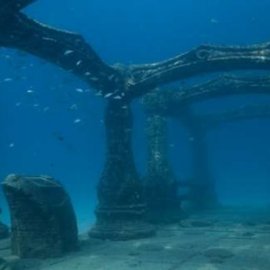Cycles and Circles
-
English
-
ListenPause
I’m Peter Neill, Director of the World Ocean Observatory. One of the first concepts we learn in natural science is the water cycle: earth’s respiration and exchange of water evaporating from the ocean, massing into weather patterns that move around the globe, deluging the land to run down from the mountain top across the foothills into the streams and rivers and watersheds until it returns to the sea again. That cycle of water, its continuity, clarity, and utility is essential to our health, as water to drink, cleanse, irrigate, and sustain us as the only thing we all need in equal amounts to survive. World Ocean Radio returns to water again and again in these editions because of the ocean as penultimate source of supply, engine for global distribution, guarantor of purity, and sustainer of its nurturing parts, the plants and animals, including ourselves, who cannot live without it. Indeed, there are circles and cycles in the ocean that occur and recur as currents and conveyors of heat and nutrients and consequent migrations that scientists continue to discover and measure that have implication for associated human interactions – fish populations, habitat, and localized meteorological conditions that correspond to food supply, patterns of work, location of communities, and the social requirements of living within this constant turning. The water column itself can be visualized as a comparable circular exchange: the fall and rise of food, temperature, pH, and the presence of light that determines micro- and macro-conditions along the way in which some life flourishes, other does not, until we reach the ocean floor through which passes the generating power of the earth’s volcanic core. And then there are the winds, the circles of air, determined by temperature or, more recently, the sudden increase in emissions resulting from the energy of modern life, realized through undisciplined extraction, burning, and consumption of irreplaceable fuel stored in the earth but now released into the atmosphere in critical amounts, particles of pollution and poison that not only affect the weather, but also the life cycle of species downwind around the world. Indeed, the earth is parsed by circles of longitude and latitude that determine the measure of where we are in space, that guided the first sailors into unknown waters, explorers to unknown places and cultures, and merchants to unknown resources and riches. The seaman’s log noted the position of the ship relative to the stars, the silhouette of the land, and the consistency of winds and currents, observations at the beginning of a system of trade, migration, finance, and societal integration that today we call globalization. History documents such cycles in the form of periods of awakening and discovery, competition, war, and the rise and fall of nation states, the exchange of philosophies and religions, and the intermingling of ideas and bloodlines that document the twists and turns of acculturation and civilization. Meaning is hidden in all of this, and wisdom, it would seem, might be still derived from such knowledge and experience. Myths often turn around circular metaphors and cyclical behaviors of gods and mortals. They tell us of things past as an instructional manual for things to come. Change can evolve, slowly over time, or it can happen suddenly, without warning, at some moment when all the gravity of circumstance forces history to turn unexpectedly, sometimes explosively. If we are so smart, why is it that we seem incapable of planning such a turn? We can engineer things, build instruments, scaled large and small, that extend the limits of our imagination, but we cannot seem to will our way out of our comfort zone, our complacency, when faced with ever-increasing, irrefutable evidence that the wheel is turning down and away from us before our very eyes. The consumption-based society that we have built over the last centuries is at risk of collapse, the fall of its architecture and institutions into the sea, forgotten if we do not pay attention. Recently, archaeologists found submerged buildings and statuary that spoke of a once great place and time. The underwater vestiges were mysterious – cold, devoid of light, and imprecise – as if flooded by regret and remorse and guilt for failing to meet the one great choice required to sustain itself in time. Continuity ended. There was no ensuing generation. The ocean took it all, and one wonders if that cycle had to be and why that circle was broken? We will discuss these issues, and more, in future editions of World Ocean Radio.
The water cycle is a complex system of evaporation, weather, wind, deluge, and run off, with the ocean at center and as source of supply. In this episode of World Ocean Radio, host Peter Neill will discuss the various cycles and circles on the planet that orchestrate every aspect of our lives here on Earth. And he will compare the cycles and circles of history and human kind, the rise and fall of civilizations, and the ways in which circumstances force turns and change—sometimes gradually evolving over time and others suddenly, without warning.
About World Ocean Radio: Peter Neill, Director of the World Ocean Observatory and host of World Ocean Radio, provides coverage of a broad spectrum of ocean issues from science and education to advocacy and exemplary projects. World Ocean Radio, a project of the World Ocean Observatory, is a weekly series of five-minute audio essays available for syndicated use at no cost by college and community radio stations worldwide.
World Ocean Radio Has Gone Global: A selection of episodes is now available in Portuguese, Spanish, French, and Swahili. For more information, visit http://www.worldoceanobservatory.org/world-ocean-radio-global.
Contact us for more information.
Image: Port Royal, Jamaica. A city which succumbed to the sea after a quake and tsunami in 1692. bohemianwords.wordpress.com via GreenBuzz.com
- Login to post comments



